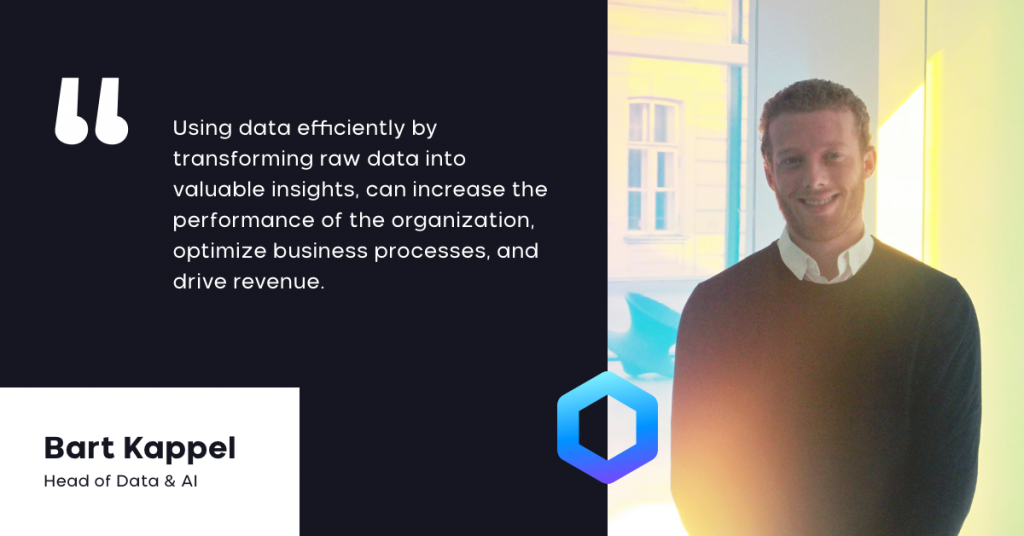In the current fast-changing world being able to make decisions fast is a must, being able to make sense of the world at lightning speed gives organizations a competitive edge. Organizations are confronted with huge amounts of data and require a solid strategy to cope with the volume, derive insights for opportunities, and use those insights for decision making.
Leveraging data by using big data technologies, analytics, Business Intelligence, Data Science, and AI can guarantee competitive advantages and transform an organization to base decisions on data instead of feelings and opinions. To be successful, companies need to develop a strategy that embraces data utilization and promotes analyses of the data.
Data lives in multiple places, which makes it harder for teams to use. At the same time, data quality can’t be guaranteed and complicates using it for innovation. The different data-silos can be linked together to optimize collaboration and automate the usage of the data, doing this across the whole organization can be challenging and introduces different limitations.
A centralized data storage solution can help mitigate the challenges of linking different data silos and will help organizations to generate and incorporate insights into their everyday decision-making.
Introducing a data-lake can give the organization multiple benefits.
Optimized data access
Data becomes more important than before. Using data efficiently by transforming raw data into valuable insights, can increase the performance of the organization, optimize business processes, and drive revenue.
Data Consistency and cross-company consensus
Data generated from different sources come in many formats and can be challenging to work with. Storing data centrally and in a custom-defined format ensures that everyone is working with the same data and insights. This improves consistency and consensus within the organization and enables decisions to be made transparent and based on data.

Improved Productivity
Centralizing all data enables people to spend their time on important things like creating value for the organization instead of processing, cleaning, transforming data, this improves productivity by allowing them to focus more on the organization’s goals. Centralized data also provides teams with an in-depth understanding of the business processes.
Time and Money saved
Raw data has little value, increasing its worth requires cleaning, processing, and analyses of the data, this can be a complicated and expensive task. Centralizing data storage and access can reduce the costs as the data becomes easier to work with, fewer steps are involved to gain insights from the data. Decentralized data requires more effort from the teams to extract and work with it, increasing the process time and costs. Here you must clearly present the potential solutions for the business problem and describe them in great detail so the reader would understand their benefits. It’s always good to present several ways to solve your business problem – this highlights that you’ve done your research and kept only the best alternatives.
Tooling
Identifying the need for centralized data storage and adjusting the business processes alone, doesn’t enable the organization to become data-driven. Centralizing data storage requires tooling to manage the different and complex aspects of data management in the organization. Having centralized data storage alone doesn’t make an organization data-driven, tools to perform transformations, apply analyses, and derive insights are required too. Using these tools can be complicated or impossible in a decentralized environment, centralization helps the adoption of these tools.
Conclusion
Using data to influence decisions can give your organization a competitive edge. Integrating analytics into any organization can be very challenging and is not limited to only applying machine learning on data. Leveraging data-driven decision making is a strategy that needs to be supported by the whole organization and starts with democratizing data and data-access. Centralizing data is one of the first steps that any organization can make and is a fundamental part of any successful data-strategy.
If you have any questions on how your organization can become data-driven, we are always open to help, book a data-consultation and let’s make sense of your data.

Bart Kappel
This article was written by TeleSoftas Head of Data & AI Bart Kappel. For more insights from Bart follow him on Linkedin.
